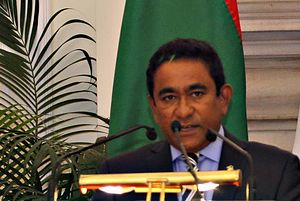Abdulla Yameen Abdul Gayoom, the former president of the Maldives, was charged with grand corruption, money-laundering, and theft by Maldivian police on Wednesday evening.
According to local news reports, police filed a case with the country’s Prosecutor General. The charges against Yameen include giving false statements to the police.
According to one report, the police investigation against the former president began after “state investigative authorities filed a police report regarding Yameen’s illegal financial transactions when he was president, which includes leasing islands via Maldives Marketing and PR Corporation (MMPRC).”
“The money owed to the state from these transactions were allegedly transferred to Yameen’s account at the Maldives Islamic Bank, which were then laundered,” the report added.
Earlier this month, the Maldivian presidential office put out a statement asking any and all citizens in the country to report information on corrupt practices and abuses of power committed by members of the previous government under Yameen.
That notice came shortly after Yameen was questioned by Maldivian authorities.
The former president is widely credited with overseeing a period of democratic backsliding in the Maldives until his defeat in the September 2018 elections. Following his defeat, Yameen attempted to have the results of the election annulled, but did not succeed thanks to the courts.
Yameen targeted the opposition, eroded the rule of the law, and, according to several international monitoring groups, authorized human rights violations in the Maldives. Under his presidency, the country withdrew from the Commonwealth after the organization warned it of possible suspension.
During his rule, Yameen pulled the Maldives away from India, historically its closest strategic partner, and toward China, which invested hundreds of millions in the archipelago. It’s unclear if the charges against Yameen are specifically linked to any Chinese investments in the country.
During his inaugural address on in November 2018, Ibrahim ‘Ibu’ Mohamed Solih, the country’s new president, referenced the cause for the government’s poor fiscal state as the previous’ government’s decision to pursue “reckless mega development projects undertaken purely for political gains.”
“Large-scale embezzlement and corruption have dwindled the coffers of the state by billions of rufiyaa. This money belongs to the Maldivian people, money that should have been spent for the common good of the people,” Solih added.
Ibrahim Ameer, the Maldives’ new finance minister, told the Financial Times earlier this month that Yameen’s actions had represented “wilful corruption.” “[The former government] knew what they were doing, getting kickbacks from contractors… That’s why the contract prices were too high.”

































